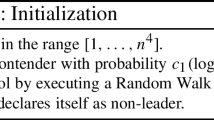Abstract
In this paper we develop a leader election protocolP with the following features:
-
1.
The protocol rums in theperfect information model: Every step taken by a player is visible to all others.
-
2.
It haslinear immunity: IfP is run byn players and a coalition ofc 1 n players deviates from the protocol, attempting to have one of them elected, their probability of success is <1-c 2, wherec 1,c 2>0 are absolute constants.
-
3.
It isfast: The running time ofP is polylogarithmic inn, the number of players.
A previous protocol by Alon and Naor achieving linear immunity in the perfect information model has a linear time complexity. The main ingredient of our protocol is areduction subprotocol. This is a way forn players to elect a subset of themselves which has the following property. Assume that up toen of the players are bad and try to have as many of them elected to the subset. Then with high probability, the fraction of bad players among the elected ones will not exceede in a significant way. The existence of such a reduction protocol is first established by a probabilistic argument. Later an explicit construction is provided which is based on the spectral properties of Ramanujan graphs.
Similar content being viewed by others
References
M. Ajtai, andN. Linial: The influence of large coalitions,Combinatorica,13 (1993) 129–145.
N. Alon, andM. Naor: Coin-flipping games immune against linear-sized coalitions,SIAM J. Computing,22 (1993) 403–417.
N. Alon, andJ. Spencer:The Probabilistic Method, Wiley, 1992.
M. Ben-Or, andN. Linial: Collective coin flipping, inRandomness and Computation, (S. Micali, ed.) Academic Press, 1989, 91–115.
A. Cohen, andA. Wigderson: Dispersers, deterministic amplification, and weak random sources,Proc. 30th IEEE Symp. on the Foundations of Computer Science (1989) 14–19.
P. Feldman, andS. Micali: Optimal algorithms for Byzantine Agreement,Proc. 20th Annual ACM Symp. on Theory of Computing (1988) 148–161.
O. Goldreich, S. Goldwasser, andN. Linial: Fault-tolerant computation in the full information model,32nd Symposium on the Foundations of Computer Science (1991) 447–457.
J. Kahn, G. Kalai, andN. Linial: The influence of variables on boolean functions,29th Symposium on the Foundations of Computer Science, White Planes, 1988, 68–80.
N. Linial: Games Computers Play-Game-Theoretic Aspects of Computer Science, in:Handbook of Game Theory with Economic Applications (R. J. Aumann and S. Hart eds.) North Holland, to appear 1994. Also available as a Leibniz Center, Computer Science Dept. Hebrew University, Tech. Report 5-92.
A. Lubotzky, R. Phillips, andP. Sarnak: Ramanujan Graphs,Combinatorica 8 (1988), 261–277.
I. S. Rombauer, andM. Rombauer Becker:Joy of Cooking, Hobbs-Merril, 1979, 154.
M. Saks: A robust noncryptographic protocol for collective coin flipping,SIAM J. Discrete Math. 2 (1989) 240–244.
Author information
Authors and Affiliations
Additional information
Work supported in part by grants from the Binational Science Foundation Israel-US and from the Israeli Academy of Sciences.
Rights and permissions
About this article
Cite this article
Cooper, J., Linial, N. Fast perfect-information leader-election protocols with linear immunity. Combinatorica 15, 319–332 (1995). https://doi.org/10.1007/BF01299739
Received:
Revised:
Issue Date:
DOI: https://doi.org/10.1007/BF01299739




